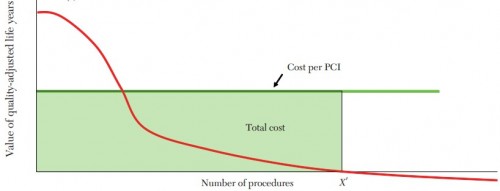It turns out, periodic, general health checks that involve routine screenings are a lot more like high-tech angioplasty than you might think. This was revealed by a Cochrane Library review published in October that evaluated the effect of general health checks on mortality and morbidity. An accompanying editorial succinctly summarized the findings, placing them in the context of prior studies.
The results of [the Cochrane review by Krogsbøll et al] are consistent with a previous systematic review by Boulware et al that also evaluated the benefits and harms of general health checks.[13] [...] The authors of both reviews reported that general health checks had no effect on mortality, disability and hospitalizations compared with usual care. [...] How should practitioners use the findings of Krogsbøll et al? Although available trials have limitations, there is no convincing evidence that general health checks are beneficial. Since patients who seek or are willing to undergo routine screening are generally healthier than those who are not [3] (indicating that general health checks are least likely to reach those who could benefit the most), and because most people do not receive interventions that are known to be beneficial, [14] general health checks do not appear to be a wise use of scarce healthcare resources. Heeding the Canadian recommendations (made more than 30 years ago) to abandon routine health checks would save money that could be better used by population-level interventions supported by effective health policy, such as the campaigns to reduce dietary sodium in Finland and the United Kingdom. [15,16]Placing greater emphasis on preventative care is among the common recommendations for health system reform. Abandoning routine health checks would seem to be the antithesis. How can one prevent what one does not see coming? The key word here is "routine," as in "providing in an untargetted way." What the Cochrane review is telling us is that some, but not all, screenings are of value. Yet even those that are, are not so for everyone.
[T]his important review should not be interpreted as nihilistic; it focuses on the screening of asymptomatic people and does not apply to interventions prompted by clinical judgment or patient concern. For all studies in the review, diagnostic testing and treatments were undoubtedly offered to participants in the control groups for these reasons, and probably improved outcomes while reducing the apparent effect of the intervention. Practitioners should continue to investigate and treat patients with symptoms or clinical clues to underlying disease or its risk factors.In other words, general health checks are a category II technology, cost-effective for some patients and low benefit for others who still may seek or receive them. Broad application is wasteful and costly, just like angioplasty (aka, percutaneous coronary intervention or PCI). Once again, here's the key chart, though in this case interpret "PCI" as "general heath checks":
 There is a population for whom the screenings (or some of them) of general health checks are highly valuable. That's where the red line is high in the chart. There is also a large population for which they are of low value. Routine application mixes the two and dilutes the observed effect on mortality and morbidity. The important message is not to abandon all preventative screenings, but to apply them more wisely.
References
3. van Walraven C, Goel V, Austin P. Why are investigations not recommended by practice guidelines ordered at the periodic health examination? Journal of Evaluation in Clinical Practice 2000;6(2):215?24. DOI:10.1046/j.1365-2753.2000.00245.x
13. Boulware LE, Marinopoulos S, Phillips KA, et al. Systematic review: the value of the periodic health evaluation. Annals of Internal Medicine 2007;146(4):289?300.
14. McGlynn EA, Asch SM, Adams J, et al. The quality of health care delivered to adults in the United States. New England Journal of Medicine 2003;348(26):2635?45. DOI:10.1056/NEJMsa022615
15. He FJ, MacGregor GA. A comprehensive review on salt and health and current experience of worldwide salt reduction programmes. Journal of Human Hypertension 2009;23(6):363?84. DOI:10.1038/jhh.2008.144
16. Holland W. Periodic health examination: a brief history and critical assessment. Eurohealth 2009;15(4):16?20. Available at http://www.euro.who.int/__data/assets/pdf_file/0011/83990/Eurohealth15_4.pdf (accessed 15 October 2012).
There is a population for whom the screenings (or some of them) of general health checks are highly valuable. That's where the red line is high in the chart. There is also a large population for which they are of low value. Routine application mixes the two and dilutes the observed effect on mortality and morbidity. The important message is not to abandon all preventative screenings, but to apply them more wisely.
References
3. van Walraven C, Goel V, Austin P. Why are investigations not recommended by practice guidelines ordered at the periodic health examination? Journal of Evaluation in Clinical Practice 2000;6(2):215?24. DOI:10.1046/j.1365-2753.2000.00245.x
13. Boulware LE, Marinopoulos S, Phillips KA, et al. Systematic review: the value of the periodic health evaluation. Annals of Internal Medicine 2007;146(4):289?300.
14. McGlynn EA, Asch SM, Adams J, et al. The quality of health care delivered to adults in the United States. New England Journal of Medicine 2003;348(26):2635?45. DOI:10.1056/NEJMsa022615
15. He FJ, MacGregor GA. A comprehensive review on salt and health and current experience of worldwide salt reduction programmes. Journal of Human Hypertension 2009;23(6):363?84. DOI:10.1038/jhh.2008.144
16. Holland W. Periodic health examination: a brief history and critical assessment. Eurohealth 2009;15(4):16?20. Available at http://www.euro.who.int/__data/assets/pdf_file/0011/83990/Eurohealth15_4.pdf (accessed 15 October 2012).